INTIMATE OPERA
Bringing opera to a wider audience is the noble goal of many a musical entrepreneur, but few succeed as well as Josh Shaw and Stephen Karr, founders of the Pacific Opera Project (POP). The company has been around less than a year, in which time it has already found its own home at the new Porticoes Theater. Their current production of Cosi Fan Tutte is the first show of any kind to be performed at the Porticoes, located in a newly renovated building at the Saint James United Methodist Church in Pasadena. The 150-seat venue gives this production a far more intimate feel than LA Opera’s grand productions at the Dorothy Chandler Pavilion. No seat is further than fifty feet from the stage; since the small orchestra is situated off to the side, there is no buffer between the front row and the action, thereby heightening the intimacy. Whether seated in the front row or the back, one can see every lifted eyebrow and amorous look. Such close proximity makes for a completely different viewing experience, reminding audiences that opera singers are as much actors as musicians.
C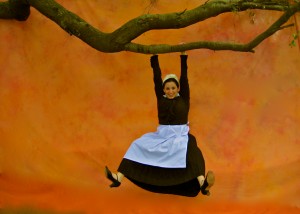 osi Fan Tutte, ossia La Scuola degli amanti – to give the play it’s full title – roughly translates as “All Women Are Like That, or The School for Lovers.” Finished and first performed in 1790, it is one of Mozart’s best-loved comic operas. Utilizing a libretto written by Lorenzo da Ponte, with whom Mozart also collaborated on Don Giovanni and The Marriage of Figaro, the opera pokes fun at the fickleness of women. The main protagonists are two soldiers, Ferrando and Guglielmo, and the sisters, Dorabella and Fiordiligi, to whom they are betrothed. Their friend Alfonso, who calls into question the fidelity of the soldiers’ fiancées, sets events in motion by making a bet. Ferrando and Guglielmo must each pretend to go off to war, while really disguising himself as an enemy soldier and seducing not his own fiancée, but that of his comrade-in-arms. Alfonso is aided in his scheme by the sisters’ maidservant, Despina, who urges each girl to accept the advances of her new suitor. It is by no means a new story, having been told in past centuries by Bocaccio, Shakespeare and others, but in Mozart’s hands it becomes far more memorable.
osi Fan Tutte, ossia La Scuola degli amanti – to give the play it’s full title – roughly translates as “All Women Are Like That, or The School for Lovers.” Finished and first performed in 1790, it is one of Mozart’s best-loved comic operas. Utilizing a libretto written by Lorenzo da Ponte, with whom Mozart also collaborated on Don Giovanni and The Marriage of Figaro, the opera pokes fun at the fickleness of women. The main protagonists are two soldiers, Ferrando and Guglielmo, and the sisters, Dorabella and Fiordiligi, to whom they are betrothed. Their friend Alfonso, who calls into question the fidelity of the soldiers’ fiancées, sets events in motion by making a bet. Ferrando and Guglielmo must each pretend to go off to war, while really disguising himself as an enemy soldier and seducing not his own fiancée, but that of his comrade-in-arms. Alfonso is aided in his scheme by the sisters’ maidservant, Despina, who urges each girl to accept the advances of her new suitor. It is by no means a new story, having been told in past centuries by Bocaccio, Shakespeare and others, but in Mozart’s hands it becomes far more memorable.
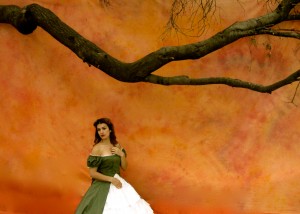 POP has creatively transposed Cosi Fan Tutte from late eighteenth century Sicily to the American South at the time of the Civil War. This allows the production to channel Gone With the Wind at every turn, from the opening credits and super-titles to the set and costumes. Such a transposition not only serves to make the setting more intelligible to American audiences, but makes the show into a kind of parody, thereby heightening the comic aspects of Mozart’s already funny opera. While the setting’s transposition to a later century and situation mostly works well, the doctor’s magnetic cure, influenced by Dr. Mesmer (the origin of our word “mesmerizing”) is absurd and out of place.
POP has creatively transposed Cosi Fan Tutte from late eighteenth century Sicily to the American South at the time of the Civil War. This allows the production to channel Gone With the Wind at every turn, from the opening credits and super-titles to the set and costumes. Such a transposition not only serves to make the setting more intelligible to American audiences, but makes the show into a kind of parody, thereby heightening the comic aspects of Mozart’s already funny opera. While the setting’s transposition to a later century and situation mostly works well, the doctor’s magnetic cure, influenced by Dr. Mesmer (the origin of our word “mesmerizing”) is absurd and out of place.
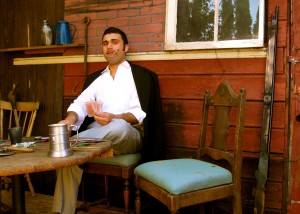 Under Josh Shaw’s direction, countless comic gestures and props are thrown in for pure fun. For example, after Ferrando (Perry Davis Harper) and Guglielmo (Michael Blinco) drunkenly fall asleep on stage and their fiancees enter, Blinco is seen with his thumb in his mouth, while Davis Harper snores loudly. Later, as the men prepare to go off to war and each drops his gun to embrace his fiancée, sound effects signify that one of the guns has shot live rounds, resulting in a horse’s leg falling from the wings onto the stage. The cast’s silly disguises also provide numerous laughs, with Despina (Jessica Mamey) not only dressing the part of the quack doctor, but also of an Abe Lincoln-like marriage registrar.
Under Josh Shaw’s direction, countless comic gestures and props are thrown in for pure fun. For example, after Ferrando (Perry Davis Harper) and Guglielmo (Michael Blinco) drunkenly fall asleep on stage and their fiancees enter, Blinco is seen with his thumb in his mouth, while Davis Harper snores loudly. Later, as the men prepare to go off to war and each drops his gun to embrace his fiancée, sound effects signify that one of the guns has shot live rounds, resulting in a horse’s leg falling from the wings onto the stage. The cast’s silly disguises also provide numerous laughs, with Despina (Jessica Mamey) not only dressing the part of the quack doctor, but also of an Abe Lincoln-like marriage registrar.
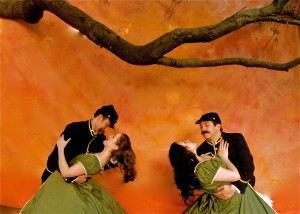 Each player in the double-cast show has quite a talent for comedy, although at times they almost get too carried away, which can prove a distraction from Mozart’s melodic music. When Blinco fell over in his chair during one scene and nearly didn’t get up, it was obvious from the looks of concern on the others’ faces that this mishap was not intended. What impressed most, though, was the way he pulled it off without a hitch and went with it. Later, when Blinco leaned off the edge of the stage and started playing with the flutist’s pony tail, conductor Stephen Karr threw something at him in order to make him stop. This all goes to show the ease with which the players interacted with each other, the audience and the orchestra.
Each player in the double-cast show has quite a talent for comedy, although at times they almost get too carried away, which can prove a distraction from Mozart’s melodic music. When Blinco fell over in his chair during one scene and nearly didn’t get up, it was obvious from the looks of concern on the others’ faces that this mishap was not intended. What impressed most, though, was the way he pulled it off without a hitch and went with it. Later, when Blinco leaned off the edge of the stage and started playing with the flutist’s pony tail, conductor Stephen Karr threw something at him in order to make him stop. This all goes to show the ease with which the players interacted with each other, the audience and the orchestra.
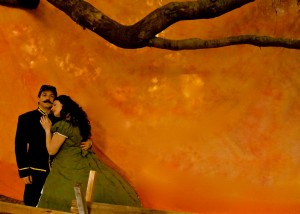 While POP’s production of Cosi Fan Tutte is fully-staged, it has been stripped-down in its performance somewhat by forgoing a full opera chorus and orchestra. Whereas Mozart’s scoring called for at least two musicians per part, Karr makes do with one. He also drops the trumpet and tympani, playing the snare drum and harpsichord himself on occasion. The smaller orchestral sound, however, works well in the confines of the Porticoes Theater and allows the opera’s stunning arias to be heard clearly. Mamey’s opening solo aria, “In uomini, in soldati,” displays to full effect a gorgeous soprano voice that is crisp and clear. Dorabella (Elizabeth Jones), Fiordiligi (Daria Somers) and Alfonso (Luvi Avendano)’s moving trio, “Soave sia il vento,” is only marred by Avendano’s somewhat thin baritone. His marvelous Italian diction serves him well during recitative sections, but lacks the texture and warmth, especially at the bottom of his range, to do Mozart’s lyrical melodies full justice. Somers, a coloratura soprano, acquits herself with aplomb in some of her role’s trickiest passages. While both Blinco and Davis Harper have excellent voices, it was the latter’s lovely tenor that most impressed, especially during his solo aria, “Un aura amorosa.”
While POP’s production of Cosi Fan Tutte is fully-staged, it has been stripped-down in its performance somewhat by forgoing a full opera chorus and orchestra. Whereas Mozart’s scoring called for at least two musicians per part, Karr makes do with one. He also drops the trumpet and tympani, playing the snare drum and harpsichord himself on occasion. The smaller orchestral sound, however, works well in the confines of the Porticoes Theater and allows the opera’s stunning arias to be heard clearly. Mamey’s opening solo aria, “In uomini, in soldati,” displays to full effect a gorgeous soprano voice that is crisp and clear. Dorabella (Elizabeth Jones), Fiordiligi (Daria Somers) and Alfonso (Luvi Avendano)’s moving trio, “Soave sia il vento,” is only marred by Avendano’s somewhat thin baritone. His marvelous Italian diction serves him well during recitative sections, but lacks the texture and warmth, especially at the bottom of his range, to do Mozart’s lyrical melodies full justice. Somers, a coloratura soprano, acquits herself with aplomb in some of her role’s trickiest passages. While both Blinco and Davis Harper have excellent voices, it was the latter’s lovely tenor that most impressed, especially during his solo aria, “Un aura amorosa.”
The Pacific Opera Project is to be commended for bringing Mozart’s Cosi Fan Tutte to the LA stage in such an accessible production. With tickets costing $15-$40, opera has not been this affordable in years. Shaw’s hilarious interpretation, coupled with his cast’s evident talent for comedy, makes Cosi Fan Tutte a laugh-out-loud show that is as cathartic as it is entertaining. Add to that Mozart’s lyrical melodies and the cast’s skilled operatic voices and you have a recipe for phenomenal success. Let’s hope that it is a success soon to be repeated – and often!
Photos courtesy of Pacific Opera Project
Cosi Fan Tutte
Pacific Opera Project (Porticoes Theater) in Pasadena (Los Angeles Theater)
scheduled to end on May 20
for tickets, visit http://www.pacificoperaproject.com
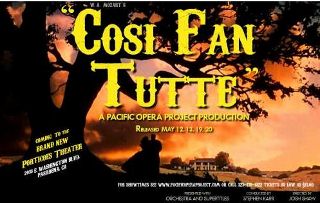

{ 1 comment… read it below or add one }
I am going to have to disagree with this review regarding the distraction of the comedy from the melodies of Mozart. (Though the magnet joke was a bit of a stretch) I have come to believe that the reason the arias are so long in these comic operas is to give the actors the space to both explore the music and the humor. The actors of Saturday nights performance not only performed with technical accuracy, they also “played,” something I am always on the look out for in theatrical work. This idea of play is especially possible with the comedies of Mozart and Shakespeare. Also, do you think audience members during the writers time were well behaved and quiet? Heavens no! This was an art form of entertainment. Not enlightenment. Lest we forget.